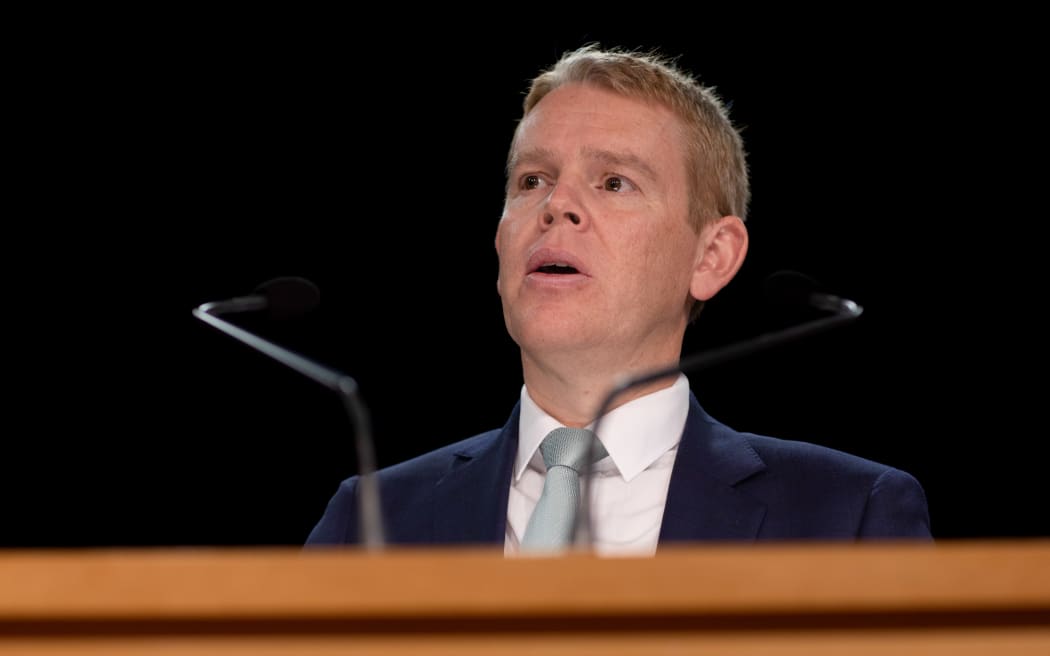Watch: Hipkins speaks about the government's 'back to basics' foreign policy

Prime Minister Chris Hipkins, in his first major foreign policy speech, has highlighted his leadership will not mean a major shift in New Zealand's approach to the world.
Speaking at an event hosted at Parliament by the New Zealand Institute of International Affairs, the prime minister began by reminding attendees he had been in the job just over six months.
It came, he said, "at a time of significant strain, both domestically and internationally", underlining the post-pandemic recession and Russia's invasion of Ukraine as "the greatest global economic shock since the great depression".
Watch Hipkins' speech live here:
Hipkins outlined how his government was not looking to shake things up.
"If you came today to hear me set out a radical departure in our foreign policy, I'm sorry to let you down," he said. "If anything, my approach in the international sphere is not that dissimilar to my priorities at home - getting back to basics and dealing with the bread and butter issues in front of us."
He ran through the usual gamut of global concerns: New Zealands closest relationships including Australia, the US, the Pacific and China; the incoming trade deals with the United Kingdom and the European Union; and growing threats to global security.
"We have seen a rise in political polarisation, a rise in more nationalist posturing, and a move away from political rationalism to the fringe, often spurred along by mis and dis-information."
Set to depart for Europe later in the day, Hipkins said the trade deal negotiated with the European Union - and likely to be signed during his visit - would be worth more than any before.
"That unlocks immediate tariff savings of around $100 million a year when it enters into force, more than any past New Zealand FTA including China," he said.
The trip will also go to Stockholm in Sweden before Hipkins attends the NATO summit in Lithuania - the second year New Zealand has been invited to participate.
"The world is changing, new threats are emerging, but I'm proud I will be there in the middle of it, representing New Zealand and our views," he said. "As I do so, I reflect that this is not new."
He outlined plans for the government to release a series of policy documents and assessments, which would include "investing in a combat-capable defence force", tackling disinformation, and building a public conversation on national security.
He also put emphasis on New Zealand's "independent foreign policy approach", a favourite phrase for successive prime ministers before him.
"The longer I've been in the role the more I've seen first-hand the enormous benefits of our independent foreign policy, our role as an honest broker, and the importance of our close relationships in enhancing our prosperity and security. It is important to stress at this point independent does not mean neutral," he said.
"As a country, we may be small, but we are not bystanders. We chart our own course, with decisions that are in our national interest."
That is an approach which has been applied particularly to China, which he described as "our most complex" relationship.
"Reports emerged just before my trip of a robust conversation between our Foreign Minister Nanaia Mahuta and the Chinese Foreign Minister. You might have noticed we didn't deny that," Hipkins said.
"Our approach has always been that we are consistent in asserting our interests, we are predictable as we advance our values and we are respectful as we engage in our relationship with China. A strong, mature and complex relationship means we will have those tough conversations.
"Putting up walls and closing doors doesn't serve us well in the long term and engagement is always preferable to isolation."
He acknowledged the recent AUKUS grouping - Australia, the United Kingdom and the United States - and continued the position of saying New Zealand would not take part in it - or at least, the nuclear submarine aspect.
"We understand the strategic drivers for AUKUS, and those partners know that New Zealand's nuclear free position is proudly long standing and it's not going to change," he said.
"We will not be part of the AUKUS nuclear submarine arrangement, and the partners in the AUKUS arrangement understand and respect that."
Bringing his speech to an end, he paid tribute to former Labour prime ministers Peter Fraser, Norman Kirk, and Helen Clark, saying New Zealand needed to embrace their "legacy of principled independence" in contributing to shaping the international environment.
"The choices we make, how we exert our influence, and how we project our voice, all matter. It means being neither naive, nor fatalistic about the challenges we face.
"I believe we're the best little country in the world. I'm proud of our foreign policy heritage and I'm committed to continuing our legacy on the world stage as a force for good."